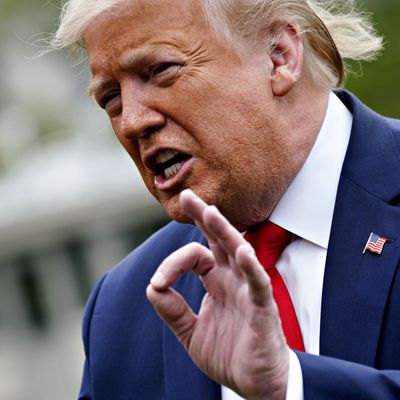
It’s generally understood that Republicans and Democrats are polarized in their assessment of the president’s coronavirus management and his strategy for reopening the economy. But analyst Ron Brownstein has looked more closely at different demographic groups and finds that preconceived assessments of Trump seem to be determinative in some groups but not in others.
Brownstein gets at the crucial variables by comparing the reaction to Trump’s handling of the pandemic among two traditionally pro-Trump groups who have been vulnerable to Democratic inroads lately: white, non-college-educated women, who largely approve of the how Trump has handled the pandemic, and white, college-educated men, who largely do not:
In the [May] Navigator [tracking poll], 56 percent of the [white non-college-educated] women said they approved of Trump’s handling of the outbreak, compared with just 44 percent of the [white college-educated] men. (The gap was smaller in the CNN poll, but the women were still more supportive.) In yesterday’s Quinnipiac University national survey, non-college-educated white women were much less likely than the college-educated men to say that Trump has not done enough to respond. In the early May Monmouth survey, a solid plurality of these women said Trump has provided mostly helpful information on the pandemic; among the men, twice as many said his information has been harmful rather than helpful.
Brownstein’s explanation is that “education trumps gender” in reactions to Trump’s recent behavior:
Operatives in both parties believe that Trump’s volatile and often-erratic pronouncements about the outbreak—such as suggesting the use of bleach and ultraviolet light to treat patients, and announcing that he is taking hydroxychloroquine—have compounded existing doubts among many well-educated white voters about his fitness for the presidency.
“There’s no question that Trump himself has reinforced the skepticism of what the people who did not like him … did not like about him before all of this,” said one GOP strategist, who requested anonymity to discuss Trump’s performance. “Now that’s on—to use another wonder drug—steroids.”
So Trump is losing ground both among the white, college-educated women who have strongly opposed him in the past, and the white college-educated men who narrowly went for him as a group in 2016, and even stuck with Republicans in 2018. And overlying both trends is Trump’s struggle to hang onto the white seniors who have supported Republicans since Bill Clinton last ran for president.
All in all, demographic groups aren’t moving as rapidly as you might expect given the chaos of the last two months or so. But to the extent voters are changing their perceptions, it hasn’t been great for Trump:
It’s remarkable how the outbreak has disrupted every aspect of American life without hugely reconfiguring the landscape for the 2020 presidential race. But to the extent that it has shifted the terrain, it has left Trump facing an even narrower path to a second term. And on that bumpy road, no rock looms before Trump more ominously than the persistent recoil from his values and performance among college-educated white voters of both genders.
He might want to think about that next time he’s tempted to say something patently stupid about COVID-19.






























